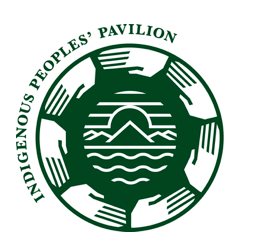|
Written by Sarah Huang  Today was the first day of the Indigenous Peoples Pavilion as well as the Civil Society "Climate Generations" meetings. Our Civil Society team: Kim, Suraya, Liz, Scott and I were split into three teams and headed to our various meetings. Suraya and I were a team and had events located in both the Civil Society rooms and the IPP (Indigenous Peoples Pavilion). Laura and Fernando were our representatives at the 'blue zone' side event meetings. The grand opening at the IPP was a motivating space for me today. It reminded me of why I am invested in environmental justice and indigenous rights. The passion that came out of this room was easily sensed in the voices of indigenous peoples all over North America (Today was North America day in the IPP. There is a different theme for each of the days during COP21). There were talks about the effects of coal mining, fracking, dams, and lack of recognition by the federal government. All of these environmental, social, and cultural harms have effects on the health and well-being of these peoples. Their passion and the strength of their voices portrayed a sense of hope that I had not felt as strongly from the other meetings that I had attended today. I was really struck by one indigenous woman from Alberta, Canada who spoke about how at bare minimum, they want recognition from state actors and delegates at COP21. It was shocking to me how these women can talk about all of these environmental and social harms, such as pollution of their river ways and being physically driven off of their lands, or the high cancer rates in their communities, but the root of all of this is the lack of recognition. She spoke about the lack of recognition of their land and cultural rights. Others throughout the day spoke about lack of recognition from the UN, or the US government, or even COP21. They were not invited to the formal 'blue zone' meetings or to have their own delegates at these meetings. They are not recognized by the UN. The US government has recognized some tribes, but promotes policies that support the degradation of environments. For example, the US government promotes the reduction of dependency on foreign oil and yet promotes the fracking and degradation of indigenous land for the drilling of oil. This demand for recognition at COP21 does not come easily, as one indigenous woman expressed. She talked about how she doesn't understand COP21 because that has meant that it has been 21 years where nothing has been done. She came to this meeting to say that we can't have a COP22. The bluntness about this statement took me aback when I actually started to consider how, just within the COP context, it has been 21 years where there has been no agreement, and indigenous peoples are still not invited to speak on their own behalf. It is frustrating for me to sit and hear this, but it is hopeful to see all of these voices coming together to speak up. This woman closed on the idea that if they never make their voices heard, then they will have failed. And so they are hear demanding for respect of indigenous rights, which would also mean the protection of their environments and their cultures. What will we see at the close of COP21? How does indigenous representation at 'blue zone' side meetings influence the climate negotiations? Stay tuned for future reports on events in the IPP. I also recommend that you look at the list of demands at COP 21from the Indigenous Environmental Network.
0 Comments
Leave a Reply. |
In the field...Follow our team as we cover international environmental policy making meetings. Project Leaders:
Dr. Kimberly R. Marion Suiseeya, Department of Political Science, Northwestern University Dr. Laura Zanotti, Department of Anthropology, Purdue University Follow us on Twitter
(@Pres2Influence) Archives
December 2019
Categories |
 RSS Feed
RSS Feed
